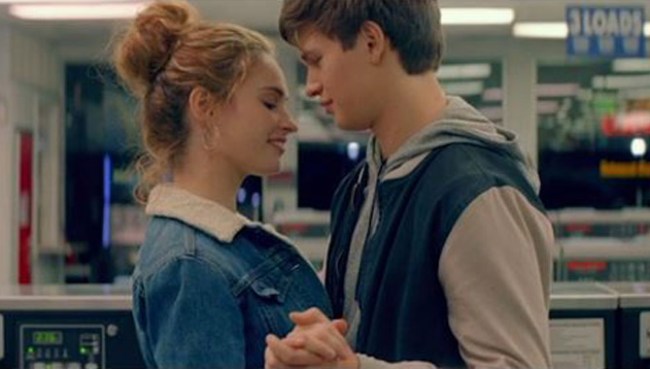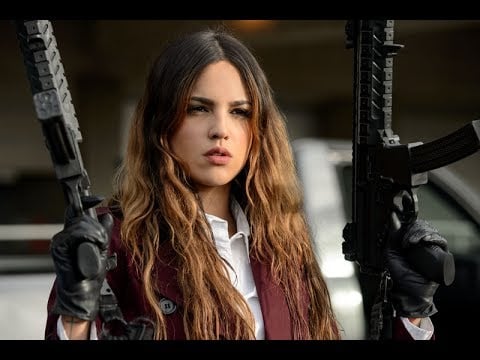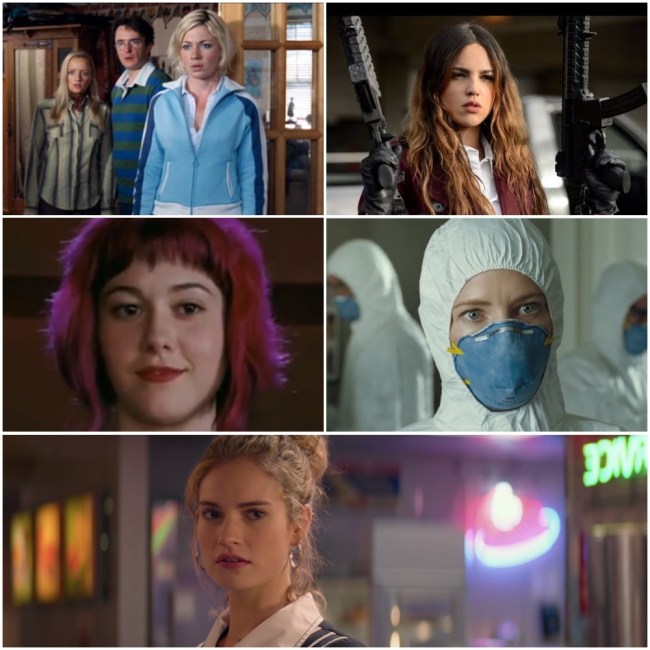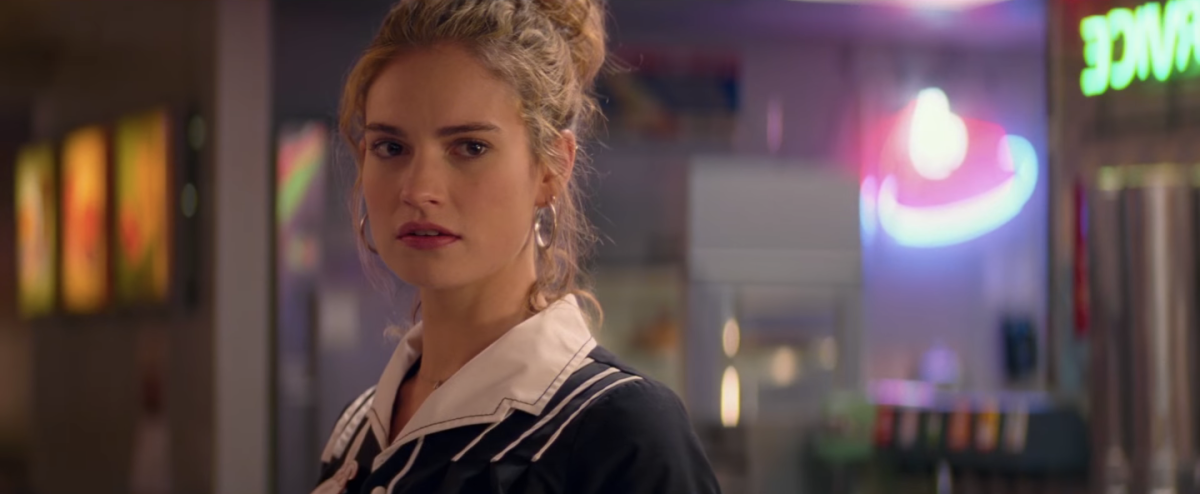First of all, I want to tell you that I’m a huge fan. I’ve thoroughly enjoyed all your films, even loved some of them, and I adore Spaced. I adore your facility with pop culture references, and I love your quick, music video style. I think your films could potentially save the world. But we need to have us a chat about women. It’s not that you write them poorly, it’s that you barely write them at all. [SPOILERS about Baby Driver]
I went to see Baby Driver, and I was immediately sucked in by the awesome bank robbery at the top of the film, where we see the lead character, Baby (Ansel Elgort), dancing in the getaway car as the three robbers he’s driving for (Jon Hamm, Eiza González, and Jon Bernthal) rob the bank with perfectly timed precision. When they leave the bank and get back into the car, Baby drives them on a car chase away from police that had me sitting on the edge of my seat. It was thrilling, and exactly what I was looking forward to about this movie.
What I wasn’t looking forward to was seeing three women in the film be underwritten to the point of non-existence.
You seem to have a long history of writing and directing films in which overgrown man-children need a stern, responsible woman to inspire them to greatness, with “stern” and “responsible” being their only defining traits. Well that, or being all about whoever the male protagonist is. Case in point:
- Shaun of the Dead – Shaun is propelled to action after his girlfriend Liz (played by Kate Ashfield, whom we don’t know much about other than that she met Shaun in Greece), tells him that he needs to grow up. Shaun wins her in the end.
- Hot Fuzz – Nick is propelled to action after his girlfriend Janine (whom we don’t know much about except what she does for a living, and we don’t even get to see her face, which is a shame, as the face belongs to Cate Blanchett) leaves him because he isn’t mature enough to be able to balance his work life and his emotional life. We don’t see Janine for the rest of the film.
- The World’s End – Gary is propelled by his own nostalgia and feelings of inadequacy to round up his old friends to complete the “Golden Mile” pub crawl they never completed in high school. However, an old friend/fling named Samantha (Rosamund Pike) arrives, and Gary immediately tries to have sex with her in a bathroom stall the way they did when they were younger. We learn that his friend Steven (Paddy Considine) has been in love with her all this time, and she basically only exists in the film to give them something to compete over.
- Scott Pilgrim Vs. the World – Scott dumps Knives Chau (Ellen Wong), the girl he’s in statutory rape territory with, for his literal dream girl (in that he sees her in a dream before he meets her) Ramona Flowers (Mary Elizabeth Winstead). The entire film is about him fighting her ex-boyfriends to win her. Knives only exists to pine after slacker Scott only to nurture him enough to tell him to follow his heart. And Ramona’s defining characteristic? Purple hair. To be fair, this isn’t entirely your fault. This was from the source material.
None of these women in your films have personalities of their own, nor do they exist outside of what the male protagonists need them to be to move the story forward.
The only truly nuanced female character in one of your projects that I can think of is the inimitable Daisy Steiner (Jessica Hynes, nee Stevenson) on Spaced. She is complicated: loveable but hugely flawed. She has big dreams, but isn’t quite sure how to pursue them, or even she even actually wants to. She’s just as much an overgrown woman-child as her friend and roommate, Tim Bisley (Simon Pegg), is an overgrown man-child. They’re in it together. And best of all, while they were continually nudged toward a romantic relationship, I’m grateful that it never came to fruition. They were simply best friends.
Meanwhile, the other women on that series, Marsha (Julia Deakin) and Twist (Katy Carmichael), were each unique and had their own drives, goals, and personalities. They existed outside the men in their lives, and those lives and goals brought about some great story conflict between them and the male characters. It was the most gender-balanced thing with which you’ve ever been involved.
Oh wait. You didn’t write that series, did you? It was created by Pegg and Stevenson, a gender-balanced writing team. So … I guess that explains it?

In Baby Driver, Baby is the protagonist. I get it. So he needs to be really well-defined. We get to know all about his back story, and about how his mom was in an abusive relationship with his dad, and was a singer, and how his parents died in a car crash, which resulted in the tinnitus that affects him as an adult. (So, his mother exists as the catalyst for everything he does, which I’ll let slide, as too many films/shows have people wanting to please their dads.)
However, he meets a cute, music-loving waitress named Debora (Lily James) at a diner he frequents, and he’s instantly smitten when she comes in singing along to whatever’s playing in her headphones. Don’t get me wrong, she’s adorable. I understand his being smitten. What I don’t understand is that throughout the entire movie, she literally has nothing else going on in her life.
But it’s not even in the specific way that would make a character interesting; where they have nothing going on now, but if they could only escape, they have plans, goals, dreams. Debora has the desire to leave, to get in a car and just drive…but that’s the extent of it. We know she hates her diner job. We know she doesn’t really have family around anymore. And we know she likes Baby.
Here’s what I don’t know. I don’t know how she watches this dude she supposedly has “strong feelings” about straight up MURDER in front of her, and she’s totally down to go away with him after 1 1/2 dates because there’s literally nothing else going on in her life, and she “really really hates her diner job?” She’s so bored, that she’d rather go off with a killer she barely knows because of reasons that are absolutely unclear because we know nothing about her.
REALLY?! Girl. GUUUUUUUURL. Wake up and smell the Bad For You. She is what seems to be every man’s fantasy. The beautiful woman who will drop everything to follow him around with sex and comfort as he leads his life and follows his dreams.

Darling fares much less well. I bet you thought you were being progressive when you chose to have a Latina badass sexpot in this film. Here’s the thing, though: Latina badass sexpot is about as stereotypical a thing as one can have in a movie. Even worse, when she and her husband and literal partner in crime, Buddy, are backed into a corner by the police toward the end of the film, she’s brutally shot dead by the police. Why? To give Buddy a reason to want to seek revenge against Baby.
Couldn’t even be bothered to flip it enough to have Buddy be the one to die so that Darling could seek revenge? I know, I know. Jon Hamm is the bigger name. Thing is, you could’ve cast a bigger name as Darling and made her more of a thing. OR, you could’ve simply used González better, as she gave a strong performance, and could easily have pushed it that much further. And how unexpected would it have been to have Jon Hamm die?
But no. You went with the expected. You gave us just enough Latina badass sexpot to titillate the audience only to kill her off to spur the dude she’s attached to into action.

Edgar … may I call you Edgar? Edgar, I have a challenge for you. I would love to see you try and write a film that’s as clever and creative and has as nuanced a protagonist as your films generally have, and make a woman the lead. I just want to see if you can do it. I want to believe that you have it in you. That, perhaps you haven’t chosen to do so simply because of the inertia that so easily affects us all while we’re “writing what we know.”
What do you say? Are you up for it?
(image: Sony)
Want more stories like this? Become a subscriber and support the site!
—The Mary Sue has a strict comment policy that forbids, but is not limited to, personal insults toward anyone, hate speech, and trolling.—









Published: Jul 25, 2017 04:55 pm